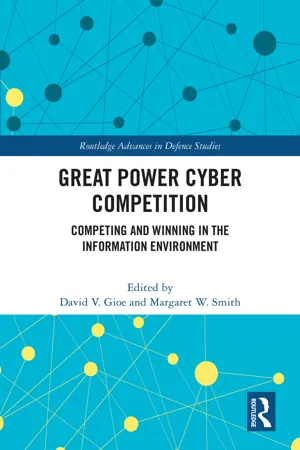
Great Power Cyber Competition
Competing and Winning in the Information Environment
- 214 pages
- English
- ePUB (mobile friendly)
- Available on iOS & Android
Great Power Cyber Competition
Competing and Winning in the Information Environment
About this book
This volume conceptualizes the threats, challenges, opportunities, and boundaries of great power cyber competition of the 21st century.
This book focuses on a key dimension of contemporary great power competition that is often less understood due to its intangible character: the competition taking place in the cyber domain, including information and cyber operations. Democracies across the globe find themselves in an unrelenting competition with peer and near-peer competitors, with a prevailing notion that no state is "safe" from the informational contest. Adversarial powers, particularly China and Russia, recognize that most competition is principally non-kinetic but dominates the information environment and cyberspace, and the volume articulates the Russian and Chinese strategies to elevate cyber and information competition to a central position. Western governments and, in particular, the U.S. government have long conceived of a war–peace duality, but that perspective is giving way to a more nuanced perception of competition. This volume goes beyond analyzing the problems prevalent in the information space and offers a roadmap for Western powers to compete in and protect the global information environment from malicious actors. Its genesis is rooted in the proposition that it is time for the West to push back against aggression and that it needs a relevant framework and tools to do so. The book demonstrates that Western democratic states currently lack both the strategic and intellectual acumen to compete and win in the information and cyber domains, and argues that the West needs a strategy to compete with near-peer powers in information and cyber warfare.
This book will be of much interest to students of cyber-warfare, information warfare, defense studies, and international relations in general, as well as practitioners.
Frequently asked questions
- Essential is ideal for learners and professionals who enjoy exploring a wide range of subjects. Access the Essential Library with 800,000+ trusted titles and best-sellers across business, personal growth, and the humanities. Includes unlimited reading time and Standard Read Aloud voice.
- Complete: Perfect for advanced learners and researchers needing full, unrestricted access. Unlock 1.4M+ books across hundreds of subjects, including academic and specialized titles. The Complete Plan also includes advanced features like Premium Read Aloud and Research Assistant.
Please note we cannot support devices running on iOS 13 and Android 7 or earlier. Learn more about using the app.
Information
Table of contents
- Cover
- Half Title
- Series Page
- Title Page
- Copyright Page
- Table of Contents
- List of Contributors
- Acknowledgments
- Introduction
- 1 A Strategic Cyberspace Overview: Russia and China
- 2 On Competition: A Continuation of Policy by Misunderstood Means
- 3 Russian New Generation Warfare in the Baltic States and Beyond
- 4 Russian Cyberspace Operations against Ukraine in the 2022 War: How Effective Have They Been and What Lessons for NATO Can Be Drawn?
- 5 Everyone a Sensor: The Implications of the Russo-Ukrainian War and the Democratization of Intelligence for Great Power Competition
- 6 In Africa, Great Power Competition Requires a Great Strategy for Information Operations
- 7 Competing for Influence: Authoritarian Powers in the Cyber Domain in Latin America
- 8 The Logic of Protraction in Cyber Conflict: Peace Would Ruin Me
- 9 Digital IEDs on the Information Highway: PSYOPS, CYBER, and the Info Fight
- 10 Cybersecurity as a Public Good: Government Intervention Is Only Part of the Solution
- 11 Unconventional Warfare in the Information Environment
- 12 Ubiquitous Technical Surveillance and the Challenges of Military Operations in the Era of Great Power Competition
- 13 Toward a Whole-of-Society Framework for Countering Disinformation
- 14 Enduring Challenges in Cybersecurity: Responding Quickly and Credibly to Asymmetric Threats
- Index